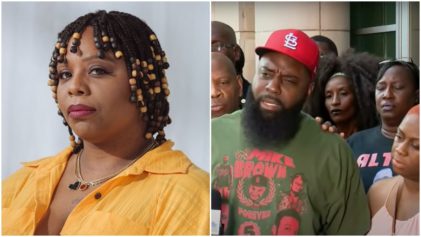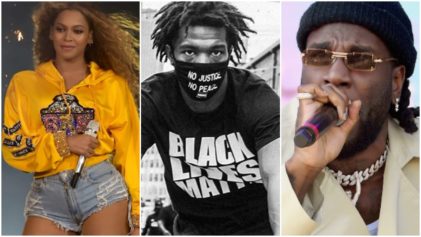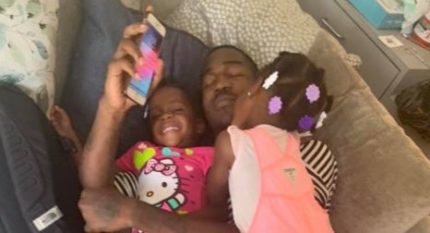Edward Crawford — also known as “da man wit the chips” is being charged a year later. (Robert Cohen/St. Louis Post-Dispatch/MCT)
Some Black men who were featured in iconic photos of the anti-police Ferguson protests are now facing charges. Edward Crawford, who was pictured throwing a tear gas canister while wearing an American flag T-shirt, and Rashaad Davis, who was pictured with his hands up surrounded by a squad of heavily-armed police, are both facing charges for interfering with the police. They are among several Ferguson protesters facing charges. They also include poets, ministers and legal observers.
The charges filed by the St. Louis County Counselor’s Office are troubling. They have been criticized by Justice Department officials who say protesters were exercising their constitutional right to protest. Christie Lopez, an official with the Justice Department’s Civil Rights division, wrote a 2010 paper called “Contempt of Cop,” where she pointed out police often overstep their boundaries when dealing with lawful protesters.
“There is widespread misunderstanding of police authority to arrest individuals who passively or verbally defy them,” Lopez wrote. “There is abundant evidence that police overuse disorderly conduct and similar statutes to arrest people who ‘disrespect’ them or express disagreement with their actions. These abusive arrests cause direct and significant harm to those arrested and, more generally, undermine the appropriate balance between police authority and individual prerogative to question the exercise of that authority.”
Even St. Louis County Police Chief Jon Belmar questioned the nature of some of the arrests.
“[Protesters] were arrested for violating a noise ordinance. I hadn’t noticed us enforcing that,” he told The Washington Post. “So I wondered why, all of a sudden, why are we doing this now?”
The police also used heavy-handed tactics to take down peaceful protesters. The attitude seems to be anyone protesting was seen as a potential threat to the police. Luke Nephew, a member of the Peace Poets, said he was part of a group that was gathered on the street when they were violently attacked by police.
“I was tackled to the ground,” Nephew told The Huffington Post. “Multiple cops jumped on me. One grabbed my face and smashed it into the concrete. I felt one of them slam his knee onto the back of my neck. All around, the police were doing the same thing to innocent people. My brothers were laid flat on the ground with automatic weapons pointed at their heads.”
However, it’s not just protesters who are facing charges. Several journalists on the ground who were reporting on protests were also charged with interfering with police. Whitney Curtis, The New York Times photographer, who snapped the dramatic picture of the unarmed Rashaad Davis being confronted by a team of gun-toting police officers, is also facing charges. Curtis, whose photo won first place in the National Press Photographers Association competition, has been charged with interfering with a police officer.
Other journalists facing charges include Huffington Post writer Ryan J. Reilly and The Washington Post’s Wesley Lowery, who were both arrested for failing to vacate a McDonald’s fast enough. In addition, Tom Walters of Canadian station CTV and Matty Giles, a New York University journalism student, have both received summons from the St. Louis County Counselor’s Office. Videographer Mary Moore is also facing charges in Ferguson Municipal Court. The St. Louis County Counselor’s Office recently settled with reporter Trey Yingst, who was unlawfully arrested by county police in November. Yingst, who won a $8,500 settlement and had all the charges against him dropped, said the police had essentially falsified charges against him,
“The whole police report was basically made up,” Yingst told The Huffington Post. He said the fact that police would bring false charges against him was disturbing.
“If that’s happening to me, and people are falsifying a police report about a white journalist, what are they doing to a black member of the community?”
Yingst said he planned to used the settlement to fund a scholarship for Ferguson-area students who want to study journalism.


